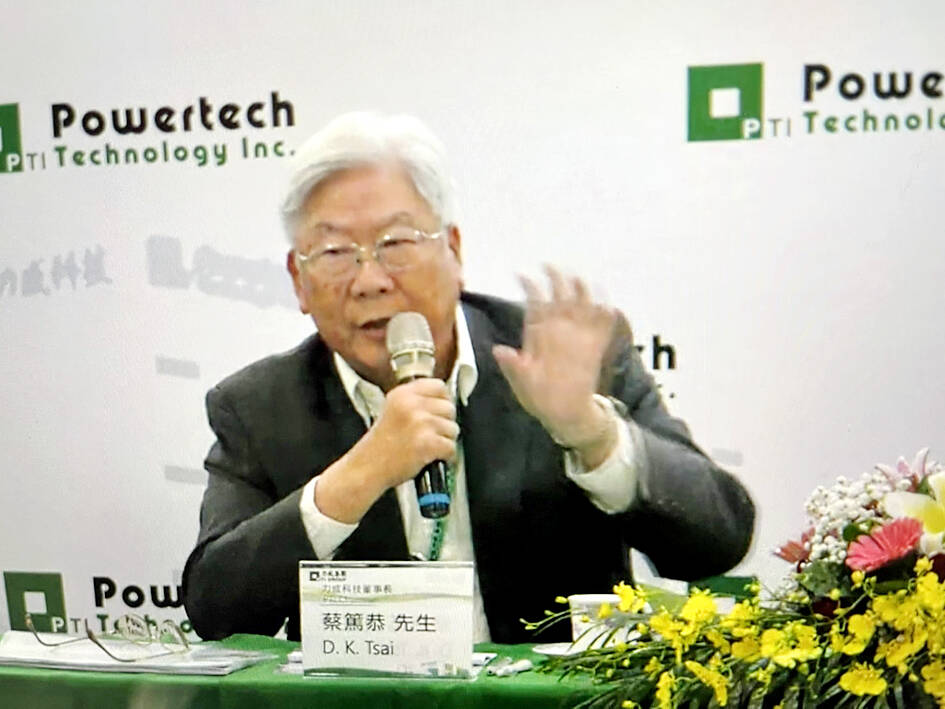Chip testing and packaging services provider Powertech Technology Inc (力成科技) yesterday said it expects a significant pickup in the second quarter of this year on recovering demand from the DRAM segment, after reporting its weakest earnings in six quarters last quarter.
The Hsinchu-based company said the first quarter would be the bottom of the current downcycle, with revenue expected to improve from the second quarter.
“The business pattern this year will be very different from what the company experienced last year, when the company reported strong results in the first half, but saw weakening performance in the second half due to the industry’s inventory correction,” Powertech chairman Tsai Du-kung (蔡篤恭) told an earnings conference.

Photo: Grace Hung, Taipei Times
Powertech expects to see a significant recovery next quarter mainly from its DRAM business as a major US customer has placed substantial orders, Powertech chief executive Boris Hsieh (謝永達) said.
DRAM demand would rise in the second half of the year with the introduction of new edge devices such as computers and smartphones equipped with artificial intelligence (AI) functions, which consume more DRAM and NAND flash memory chips, Hsieh said.
Hsieh expects revenue contribution from AI-related businesses to rise further this year. AI-related businesses made up 8 percent of the company’s total revenue last quarter, up from 4 percent in the first quarter of last year when the new business started contributing revenue.
To harness the strong growth opportunities from the AI boom, Powertech is deploying advanced chip packaging capacity, including chip-on-wafer, 2.5-dimensionIC, 3-dimensionIC packaging, and other products, the company said.
Powertech’s chip-on-wafer packaging service is targeting system companies, rather than foundry companies such as Taiwan Semiconductor Manufacturing Co (TSMC, 台積電), Tsai said.
TSMC has outsourced some chip-on-wafer orders to local chip packagers such as Siliconware Precision Industries Co (矽品精密) to mitigate capacity constraints.
The company plans to allocate NT$15 billion (US$457.8 million) for capital expenditure this year, up about 15 percent from NT$13 billion last year.
During the fourth quarter last year, the company’s net profit plummeted 55.7 percent year-on-year to NT$1.93 billion, supported by a disposal gain of NT$3.57 billion from selling one of its Chinese plants. On a sequential basis, net profit dipped 10.5 percent from NT$2.15 billion.
Last year as a whole, Powertech posted net profit of NT$8.5 billion, down 10.6 percent from NT$9.51 billion in 2023. Earnings per share fell to NT$9.09 from NT$10.72.
The company has proposed distributing a cash dividend of NT$7 per share, the same as last year, suggesting a payout ratio of 77 percent.

Taiwan Semiconductor Manufacturing Co (TSMC, 台積電) yesterday said that its investment plan in Arizona is going according to schedule, following a local media report claiming that the company is planning to break ground on its third wafer fab in the US in June. In a statement, TSMC said it does not comment on market speculation, but that its investments in Arizona are proceeding well. TSMC is investing more than US$65 billion in Arizona to build three advanced wafer fabs. The first one has started production using the 4-nanometer (nm) process, while the second one would start mass production using the

A TAIWAN DEAL: TSMC is in early talks to fully operate Intel’s US semiconductor factories in a deal first raised by Trump officials, but Intel’s interest is uncertain Broadcom Inc has had informal talks with its advisers about making a bid for Intel Corp’s chip-design and marketing business, the Wall Street Journal reported, citing people familiar with the matter. Nothing has been submitted to Intel and Broadcom could decide not to pursue a deal, according to the Journal. Bloomberg News earlier reported that Taiwan Semiconductor Manufacturing Co (TSMC, 台積電) is in early talks for a controlling stake in Intel’s factories at the request of officials at US President Donald Trump’s administration, as the president looks to boost US manufacturing and maintain the country’s leadership in critical technologies. Trump officials raised the

‘SILVER LINING’: Although the news caused TSMC to fall on the local market, an analyst said that as tariffs are not set to go into effect until April, there is still time for negotiations US President Donald Trump on Tuesday said that he would likely impose tariffs on semiconductor, automobile and pharmaceutical imports of about 25 percent, with an announcement coming as soon as April 2 in a move that would represent a dramatic widening of the US leader’s trade war. “I probably will tell you that on April 2, but it’ll be in the neighborhood of 25 percent,” Trump told reporters at his Mar-a-Lago club when asked about his plan for auto tariffs. Asked about similar levies on pharmaceutical drugs and semiconductors, the president said that “it’ll be 25 percent and higher, and it’ll

CHIP BOOM: Revenue for the semiconductor industry is set to reach US$1 trillion by 2032, opening up opportunities for the chip pacakging and testing company, it said ASE Technology Holding Co (日月光投控), the world’s largest provider of outsourced semiconductor assembly and test (OSAT) services, yesterday launched a new advanced manufacturing facility in Penang, Malaysia, aiming to meet growing demand for emerging technologies such as generative artificial intelligence (AI) applications. The US$300 million facility is a critical step in expanding ASE’s global footprint, offering an alternative for customers from the US, Europe, Japan, South Korea and China to assemble and test chips outside of Taiwan amid efforts to diversify supply chains. The plant, the company’s fifth in Malaysia, is part of a strategic expansion plan that would more than triple